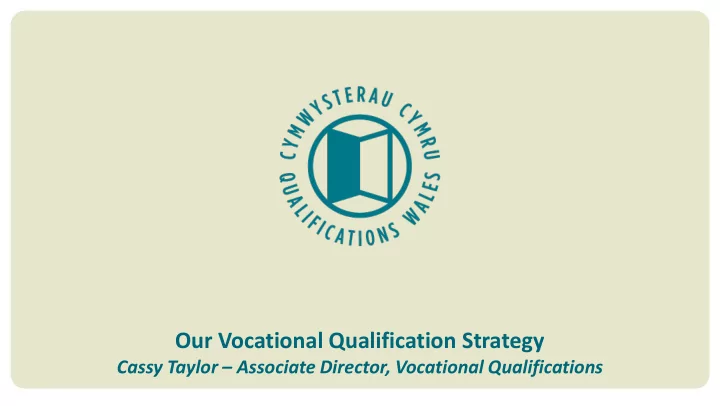

Our Vocational Qualification Strategy Cassy Taylor – Associate Director, Vocational Qualifications
Vocational Qualification Strategy • Sector Reviews: continue with a programme of sector reviews as the backbone of the strategy over the next 4-5 years. • Monitoring and Compliance: implement a programme of qualification monitoring on selected qualification types. Two initial projects: – Essential Skills – First Aid, Food Safety, Health and Safety • Development and commissioning: implement the main commitments of the Health and Social Care review. • Designated qualifications: review of policy and process. • Grant funding support for Welsh medium assessment . • Research: developing a research and analysis strategy and supporting sector reviews.
Sector Reviews - Aims • Develop an understanding of the qualification landscape in the sector • Identify the views of stakeholders on the effectiveness of existing qualifications and the system in meeting the needs of learners, employers and higher education institutions • Consider the extent to which a sample of qualifications are technically effective and fit for purpose • Identify any lessons to be learned from qualifications in other comparable nations • Identify whether Qualifications Wales should take, or recommend others to take, any actions to improve the effectiveness of the qualifications and/or the system. • Analyse and impact assess options for action and publish a report on findings and proposals.
Sequence of sector reviews • Construction and the Built Environment • ICT • Engineering, advanced manufacturing and energy • Financial services • Customer services and retail • Travel and tourism, hospitality and catering
Focus Qualifications used in publicly funded programmes of learning, especially: • Qualifications taken by learners aged 14-16. • Qualifications taken by learners aged 16-18 in full time programmes of learning. • Qualifications used in apprenticeship frameworks. As well as • Other qualifications that the sector tells us its important to look at. • Any gaps that the sector tells us about. • Any other regulated qualifications about which the sector raises concerns . • Aspects of the qualification system about which the sector raises concerns – or which we identify through other sources.
Core lines of enquiry – the extent to which: • the range and nature of qualifications available in the sector are sufficient; • the assessment arrangements for qualifications are effective, reliable and valid; • the provision of Welsh medium assessment is sufficient; • the requirements of employers, higher education and the professions are being met; • the knowledge, skills and understanding requirements reflect current knowledge and best practice; • the qualifications are comparable with qualifications elsewhere; • the qualifications in the sector are provided efficiently and represent value for money.
Methodology • Appointment of a sector advisor on secondment • Interviews with stakeholders – including a target of 100 employers and all main learning providers • Engagement with awarding bodies – we’d welcome suggestions as to how best to do so. • Stakeholder panels – North and South • Learner engagement project • Data analysis • Online consultation • Technical review of materials – awarding body materials and learner portfolios • International comparison study
Key findings of Health and Social Care Review • Complexity of the system • Unclear progression routes for learners • Gaps between levels • Learning and assessment issues impacting on qualifications • Inconsistent assessment and quality assurance processes • Some ineffective and inefficient assessment models • Some qualifications out of date • Insufficient assessment in the medium of Welsh
Actions: we will… • Work with sector bodies, other experts and awarding bodies to ensure that a new suite of qualifications in health and social care, childcare learning and development are developed to meet the needs of learners in Wales from 14 upwards, to address the issues raised in our review; • Support the introduction of this new suite with an effective programme of change management; • Ensure that learners, employers and other interested stakeholders have clear and unambiguous information on the new qualifications once they are available; • Seek assurances from awarding bodies that concerns about the quality of assessment are addressed, while the present qualifications remain.
Timescale for Construction and Built Environment • Sept 2016 - Review start-up • Oct 2016 to April 2017 - Stakeholder engagement • Dec 2016 to Mar 2017 - International comparison study • Jan 2017 to Feb 2017 - Learner engagement • Jan 2017 to Mar 2017 - Technical review • May 2017 to Jul 2017 - Options analysis and impact assessment • Sept 2017 - Report ICT runs parallel though starting slightly later – reporting December 2017.
Any questions?
Recommend
More recommend